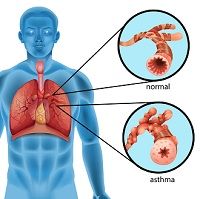Article
AerobiKa Device Well Tolerated in Children with Asthma, but Disease Scores Unaffected
Author(s):
AerobiKa, a vibratory positive expiratory pressure device meant to reduce mucus plugging, “did not demonstrate statistical significance in terms of improved clinical asthma score or reduced hospitalization rate.â€

The AerobiKa device is well-tolerated by pediatric patients with asthma in the emergency department (ED) according to a recent study. Published in JSM Allergy and Asthma, the study was conducted by Zahra Kamal, MD, of the Department of Pediatrics at the Medical University of South Carolina and colleagues.
When children come to the ED with acute asthma exacerbations, the current standard of treatment includes administration of short-acting beta agonist medications, usually by aerosol. A previous study demonstrated the superiority of using a breath actuated nebulizer (BAN). However, the researchers say, “Little has been published on interventions to improve mucus plugging during acute asthma exacerbations.”
“Vibratory positive expiratory pressure (PEP) devices have been studied extensively and compared to other forms of physiotherapy in patients with cystic fibrosis,” say the researchers, but “little has been published on ways to decrease mucus plugging in patients with acute flares of asthma.” The AerobiKa was designed and developed for use in patients with cystic fibrosis and attaches to a BAN device. “Our goal was to explore the use of AerobiKa in patients presenting to the PED [pediatric emergency department] for asthma exacerbations, specifically its tolerance and safety,” say the researchers.
The authors describe the present study as being “a retrospective, non-randomized, non-blinded convenience sample.” A total of 21 patients received treatment with the AerobiKa (Group A), and 39 with the BAN only (Group B). “Seven patients from Group A (33%) were admitted as compared to five patients (13%) from Group B,” report the researchers. No adverse events were reported in either group.
“Although our study did not show a reduced admission rate or amount of albuterol used, it is important to note that the comparison group was significantly remote in time,” say the authors. They also note that Group A appeared to be sicker upon assessment. “Groups A & B were not matched for season or controller inhaler use which could have accounted for the difference in admission rate,” say the researchers.
“The use of the AerobiKa device is well tolerated by patients in the PED,” conclude the researchers. They suggest that further studies should be conducted, particularly those involving more severe exacerbations.
Related Coverage:
Discontinuing Omalizumab Can Exacerbate Asthma
Are Children Growing Up Near Highways More Likely to Be Asthmatic?
Atopy and Allergen Exposure Impact Asthma Severity in Children





